Deputy Ombudsman actively participates in European Network of Ombudsmen conference on handling environmental complaints
On 20 and 21 November 2025, the Deputy Ombudsman, Dr Dijana Možina Zupanc, attended the European Network of Ombudsmen (ENO) conference, which was hosted by the European Ombudswoman, Teresa Anjinho. The conference featured discussions on eight topics, ranging from monitoring the implementation of European Union law, to the impact of regulatory simplification on the work of ombudsmen, and the challenges associated with supervising the activities of semi-private institutions. Given the many challenges currently facing ombudsmen and national human rights institutions across Europe, the conference also offered a valuable opportunity to promote closer collaboration between these institutions, facilitate the exchange of experiences, and collectively address issues that will require even more attention from human rights defenders in the future.
Dr Možina Zupanc participated actively in the conference, acting as rapporteur for the workshop entitled 'Sharing ombudsmen's experiences in dealing with environmental complaints', which was moderated by Dr Joseph Zammit McKeon, the Maltese ombudsman. Representatives from the European Commission also participated, including Stephanos Ampatzis (Directorate-General for the Environment) and Lucile Le Breton (Directorate-General for Justice).
Participants emphasised the importance of ombudsmen in safeguarding the right to a healthy living environment. This is particularly pertinent in cases involving complaints relating to environmental impact assessment procedures, spatial planning, access to environmental information and the implementation of the Aarhus Convention.
As rapporteur, Dr Možina Zupanc summarised the key findings and drew attention to environmental complaints submitted to ombudsman institutions relating to health, dignity, safety and intergenerational justice. She pointed out that Slovenia and other European countries face very similar challenges, including excessively long and ineffective inspection procedures, limited access to environmental information, formalistic environmental assessments that often lack a connection to reality, intense pressure on natural resources and an increasingly frequent occurrence of greenwashing.
She emphasised that key challenges to the environment — and thus to human rights — include industrial plants operating for decades without adapting to modern environmental standards and insufficiently ambitious climate policies. She called for closer collaboration within the European Network of Ombudsmen, since environmental issues are cross-border and no single country can address them alone. She proposed that the Network should strengthen the exchange of good practices, identify systemic shortcomings and conduct parallel investigations that could contribute to greater accountability on the part of countries and institutions. “No European citizen should have their right to a healthy environment violated simply because there is a national border between them and the problem,” she stressed. She said that human rights defenders must act as the voice of the most vulnerable, drawing attention to systemic shortcomings to ensure that countries not only act lawfully, but also that they act responsibly towards future generations. She added, “Behind every polluted river, every delay and every ignored complaint, there is someone who pays the price. The greatest cost of inaction is not financial — it is human,” said Dr Dijana Možina Zupanc.
During the conference, she had the opportunity to speak with several colleagues from related institutions, including the European Ombudswoman, Teresa Anjinho. They discussed the shared challenges of environmental protection and the strengthening of the right to a healthy living environment. Dr Možina Zupanc emphasised that the environmental crisis is also a significant human rights issue. “Climate change is one of the greatest threats to human rights in the modern world. Rising temperatures, floods and droughts are already endangering the health, safety and dignity of many people. These pressures are also causing migration — by 2050, up to 216 million people could be displaced — and vulnerable groups are particularly exposed. Recent rulings by the European Court of Human Rights and the International Court of Justice confirm that inadequate environmental protection by states constitutes a human rights violation. This places a responsibility on human rights institutions to protect these rights.”
Against this backdrop, the Deputy Ombudsman drew attention to the proceedings at the 30th Climate Change Conference in Amazonia, Brazil, where nations are negotiating strategies to mitigate air pollution and curb global warming. “While world leaders have been making empty promises about limiting emissions and preserving biodiversity for three decades, tropical forests continue to shrink, the atmosphere continues to warm, and climate disasters are becoming an everyday occurrence for many people, including those in Slovenia. The time for procrastination is over.”
"Protecting the environment is no longer a choice, but a moral duty to future generations, as well as to those who are already experiencing the consequences today. We cannot wait for theory to become practice — we must start now, each of us individually,” says Dr Dijana Možina Zupanc.
She therefore believes that it is essential for human rights defenders and other institutions to highlight the state's shortcomings, raise awareness of the right to a healthy environment, and promote ambitious and fair environmental policies. Dr Dijana Možina Zupanc, the Deputy Human Rights Ombudsman, says that protecting human rights means protecting the very conditions of life.
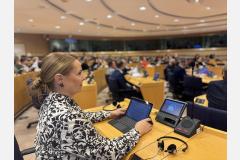
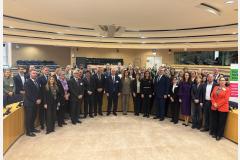
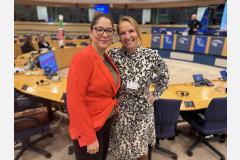 The Ombudswoman
of the Republic of Croatia dr. Tena Šimonović Einwalter and deputy ombudsman dr. Dijana Možina Zupanc
The Ombudswoman
of the Republic of Croatia dr. Tena Šimonović Einwalter and deputy ombudsman dr. Dijana Možina Zupanc
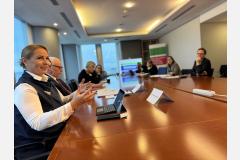






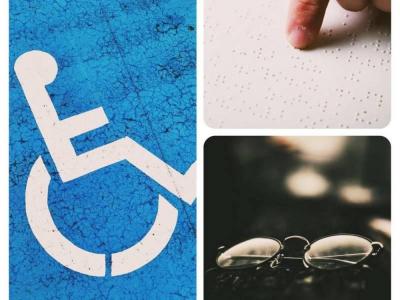





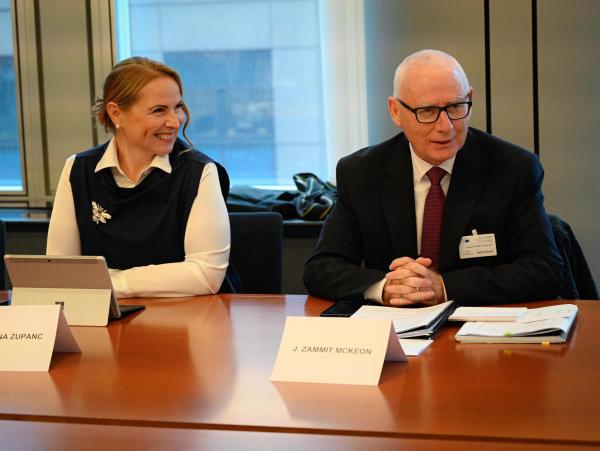

 Back
Back 






